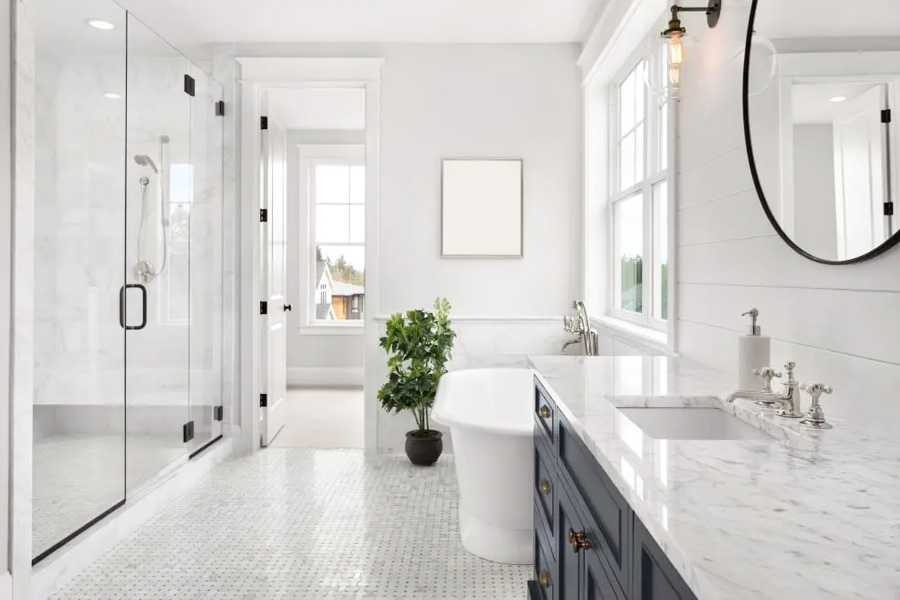Baltimore’s #1 Choice For Tile
We pride ourselves on offering a vast array of high-quality tiles that cater to various styles and budgets. Whether you’re aiming for a sleek modern look, a rustic charm, or a classic elegance, we have the perfect tile options to bring your vision to life. The best part? You can shop from the comfort of your home!
YOUR STYLE. YOUR WAY.

Highly Recommend!
Great experience with this tile store! The staff was knowledgeable and helped me find the perfect tile for my bathroom. The selection was impressive, and prices were reasonable. Installation was smooth, and my tiles look amazing.
Linda S.
Columbia, MD

Will Definitely Be Back!
Awesome service and fantastic tile selection! Found the perfect tiles for my kitchen and the team made the process easy. Installation was quick, and the results are stunning. The quality and variety are top-notch.
John V.
Baltimore, MD
Floor Tile Buying Guide
Choosing the right floor tile can significantly enhance the beauty and functionality of your home. Whether you are remodeling a kitchen, updating a bathroom, or revamping a living space, floor tiles offer a versatile and durable flooring solution. For homeowners in Baltimore, MD, selecting the right floor tile involves considering various factors like material, style, durability, and maintenance. This guide will help you navigate the floor tile buying process, tailored specifically to the needs and preferences of Baltimore residents.
Floor Tile Options
There are several types of floor tiles available, each with distinct characteristics that make them suitable for different applications. The most popular types include ceramic, porcelain, natural stone, and luxury vinyl tiles. Understanding the differences between these options can help you make an informed decision:
- Ceramic Tiles: Ceramic tiles are a popular choice due to their affordability, versatility, and ease of maintenance. Made from clay and kiln-fired, ceramic tiles are available in a wide range of colors, patterns, and sizes. They are well-suited for areas with moderate foot traffic, such as kitchens and bathrooms. However, ceramic tiles are more porous than porcelain, making them less resistant to moisture and stains, so proper sealing is recommended, especially in Baltimore’s humid environment.
- Porcelain Tiles: Porcelain tiles are denser, harder, and more water-resistant than ceramic tiles, making them ideal for high-traffic areas and spaces prone to moisture, like bathrooms and mudrooms. They are also highly resistant to scratches and stains, which makes them a durable option for homes with pets or children. Porcelain tiles are available in a variety of finishes, including matte, polished, and textured, providing plenty of design flexibility.
- Natural Stone Tiles: Natural stone tiles, such as marble, granite, slate, and travertine, offer a luxurious and timeless aesthetic. Each stone type has its unique characteristics, with marble offering a sleek, polished look and slate providing a more rustic, textured finish. While natural stone tiles are highly durable, they require regular sealing to protect against stains and moisture. Their high-end appeal and durability make them a popular choice for upscale kitchens, entryways, and bathrooms in Baltimore homes.
- Luxury Vinyl Tiles (LVT): LVT combines the realistic look of stone or ceramic with the comfort and ease of vinyl. It’s a versatile option that provides excellent water resistance, making it suitable for any room in the house, including basements. LVT is softer underfoot than traditional tiles, offering added comfort and sound insulation. It’s also easier to install, with many options featuring click-lock systems that are perfect for DIY projects.
Selecting The Right Tile Material
Choosing the right tile material depends on various factors, including the room’s function, traffic level, and exposure to moisture. Here are some considerations for selecting the best tile material for different areas of your home:
- Kitchens: For kitchen floors, durability and stain resistance are key. Porcelain tiles are an excellent choice due to their high resistance to spills, scratches, and heavy foot traffic. Natural stone tiles can also work well, but they require more maintenance. Ceramic tiles are a budget-friendly alternative that offers a wide range of design options.
- Bathrooms: In bathrooms, water resistance is the most important factor. Porcelain and ceramic tiles are both suitable, but porcelain’s superior water resistance makes it the preferred choice for wet areas. Natural stone tiles like marble can add a luxurious touch, but they need to be sealed regularly to prevent water damage.
- Living Areas: For living rooms, hallways, and other high-traffic areas, consider tiles that are durable and easy to maintain. Porcelain tiles with a textured finish can provide slip resistance, making them safer for homes with children or elderly residents. LVT is also a great option for these areas, offering comfort and warmth underfoot.
- Basements: Basements in Baltimore can be prone to moisture, making waterproof tiles a necessity. LVT is an ideal choice for basements due to its water resistance and ability to withstand fluctuating temperatures. Porcelain tiles are another excellent option, as they are impervious to water and highly durable.
Tile Sizes & Patterns
Tile size and pattern can significantly impact the look and feel of your space. Larger tiles, such as 12×24 inches or larger, are popular in modern designs and can make a room appear more spacious. Smaller tiles, such as mosaics, are often used for decorative accents or in areas with complex layouts, like shower floors.
- Large Format Tiles: Large format tiles are a great choice for creating a sleek, modern look. They reduce the number of grout lines, which can make a space feel more open and are easier to clean. These tiles work well in open-concept areas like living rooms and kitchens.
- Mosaic Tiles: Mosaic tiles, often made of ceramic, glass, or natural stone, are perfect for adding decorative elements to your space. They are commonly used as backsplashes, shower floors, or accent walls. Mosaics come in various shapes, including hexagons, penny rounds, and subway tiles, offering endless design possibilities.
- Subway Tiles: Subway tiles are a classic choice that works well in both traditional and contemporary settings. Typically used on walls, they can also be used on floors for a cohesive look. Their rectangular shape allows for various layout patterns, such as herringbone or stacked, adding visual interest to your design.
Costs & Budget Considerations
Tile flooring can vary significantly in price depending on the material, size, and style. On average, ceramic tiles cost between $1 to $5 per square foot, while porcelain tiles range from $3 to $10 per square foot. Natural stone tiles can be more expensive, with prices ranging from $5 to $20 per square foot or more, depending on the type of stone.
- Material Costs: Ceramic tiles are the most budget-friendly option, while porcelain offers enhanced durability and water resistance at a slightly higher cost. Natural stone tiles are on the higher end of the price spectrum but provide a unique, luxurious appearance that can increase your home’s value.
- Installation Costs: Professional installation costs can range from $4 to $12 per square foot, depending on the complexity of the project and the type of tile. While DIY installation is possible for some tile types, hiring a professional ensures proper alignment, cutting, and grouting, resulting in a polished finish.
- Additional Expenses: Don’t forget to budget for additional materials, such as grout, sealant, and underlayment. If you’re installing tiles in a moisture-prone area, consider investing in a waterproof membrane or backer board for added protection.
Maintenance & Care
Proper maintenance is essential to keep your tile floors looking their best. Here are some general care tips for different tile types:
- Ceramic and Porcelain Tiles: These tiles are easy to maintain with regular sweeping or vacuuming to remove dirt and debris. Mop with a mild detergent and warm water to keep them clean. Avoid using abrasive cleaners that can scratch the surface.
- Natural Stone Tiles: Stone tiles require more maintenance, including regular sealing to protect against stains and moisture. Use a pH-neutral cleaner specifically designed for stone to avoid damaging the surface.
- Luxury Vinyl Tiles: LVT is low maintenance and easy to clean with regular sweeping and occasional mopping. Avoid using excessive water or harsh chemicals, which can damage the wear layer.
The #1 Tile Store In Baltimore
With a wide selection of floor tile options and professional installation services, we are the best choice for those in Baltimore looking for quality flooring solutions. We offer next-day installation, competitive pricing, and expert advice to help you select the best tiles for your specific needs. Whether you’re seeking durable porcelain for high-traffic areas, elegant natural stone for a touch of luxury, or stylish ceramic for a budget-friendly upgrade, our team is here to guide you every step of the way. Trust us to transform your space with beautiful, high-quality tile flooring that suits your style and budget.
Frequently Asked Questions
What Is The Difference Between Ceramic & Porcelain Tiles?
Ceramic and porcelain tiles are both made from clay and kiln-fired, but porcelain is denser, more durable, and less porous than ceramic. Porcelain tiles are better suited for high-traffic and moisture-prone areas due to their superior water resistance and strength, while ceramic tiles are often more affordable and available in a wider range of colors and patterns, making them a great choice for walls and low-traffic areas.
Are Floor Tiles Suitable For Outdoor Use?
Yes, but not all tiles are suitable for outdoor use. For outdoor areas, it’s best to choose tiles that are specifically rated for exterior use, such as frost-resistant porcelain or certain natural stones like slate. These tiles can withstand Baltimore’s varying weather conditions, including freezing temperatures and heavy rainfall, without cracking or deteriorating.
How Do I Choose The Right Grout Color For My Floor Tiles?
Choosing the right grout color can significantly impact the overall look of your tile floor. A grout color that matches the tile will create a seamless, uniform appearance, while a contrasting grout color can highlight the tile pattern and add visual interest. Consider your design goals and the level of maintenance you’re comfortable with, as lighter grout colors can show stains more easily than darker ones.
How Should I Maintain & Clean My Tile Floor?
Maintaining and cleaning floor tiles is generally straightforward. For ceramic and porcelain tiles, regular sweeping or vacuuming and mopping with a mild detergent and water is usually sufficient. Avoid abrasive cleaners that can scratch the tile surface. For natural stone tiles, use a pH-neutral cleaner and avoid acidic substances like vinegar, as they can damage the stone. Additionally, natural stone tiles should be sealed regularly to protect against stains and moisture.









